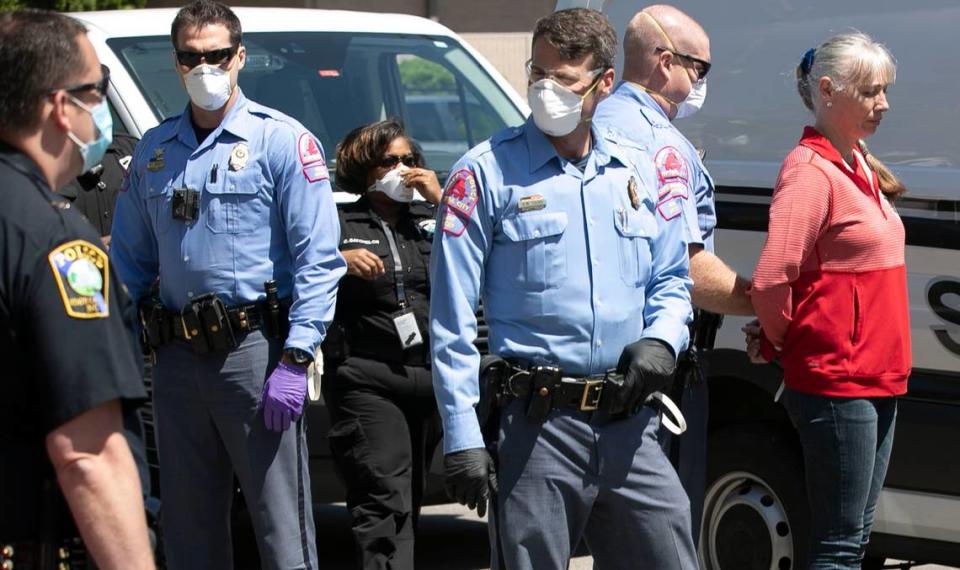‘Economic suicide:’ Backlash grows against coronavirus restrictions in NC
It was less than two weeks ago that Ashley Smith and two friends started a Facebook group called Reopen NC. Now it claims almost 50,000 members, with another 50,000 awaiting approval.
“If this goes on we will lose every small business in North Carolina,” said Smith, 33, of Morganton. “We are committing economic suicide.”
Smith is part of a growing national backlash over government orders that have brought much of the economy to a halt in an effort to stem the COVID-19 crisis that, through Friday, had killed more than 31,000 Americans, including more than 150 in North Carolina.
N.C. Democratic Gov. Roy Cooper has ordered many businesses closed and limited the size of public gatherings.
The growing struggle pits public health advocates against people whose lives have been upturned and who watch as millions join the unemployment rolls.
On Tuesday Smith, who home schools her children, joined more than 100 others at a protest outside the General Assembly. One protester was arrested. In a tweet, the Raleigh police department called it a “non-essential activity.”
A similar protest this coming Tuesday will include at least one member of Congress.
“After the Raleigh Police announced that protesting was a ‘non-essential’ activity, I decided to attend the rally to stand for our Constitution and North Carolinians’ First Amendment rights because Governor Cooper has not stood up for those First Amendment rights,” Republican U.S. Rep. Dan Bishop said through a spokeswoman. “I am deeply troubled . . . by government infringing upon those rights.”
There’s no doubt the restrictions have taken a toll on the economy.
Nearly 637,000 North Carolinians have filed for unemployment, according to the state Commerce Department. Nationwide, more than 22 million Americans are out of work. More than 9 in 10 Americans are under stay-at-home orders.
Days ago, President Donald Trump issued guidelines for states to reopen. They include a drop in confirmed coronavirus cases over a two-week period, hospital capacity and more testing.
Cooper has said that based on that, North Carolina is not ready.
“The biggest problem we have right now is testing capacity,” Cooper said Thursday night on MSNBC. “What we need from the federal government right now is help on that testing capacity and with supplies and with personal protective equipment.”
Protests grow
For many people, the state’s not moving fast enough.
CEO Bob Luddy has furloughed the 150 employees of Raleigh’s CaptiveAire, which manufactures commercial kitchen ventilation systems. In an open letter to Cooper, he said, “You created this tragedy.”
“All the working-class people I know want to be at work because they understand the connection between work and eating,” Luddy, a prominent Republican donor, told the Observer. “Whereas the government-class, they’re going to get paid and they’re going to have their health care whether they work or not.”
Around the country, there are groups similar to Smith’s Reopen NC. Among them: Reopen Texas, Reopen California and Reopen Florida. Thousands of protesters clogged Michigan’s capital this month to protest Democratic Gov. Gretchen Whitmer’s stay-at-home orders. More than 1,900 Michigan residents have died of COVID-19.
The Washington Post reported that conservative groups, including the Heritage Foundation and at least one Tea Party group, are behind many of the protests. It said the Michigan protest was organized by groups founded by the political adviser to the family of Education Secretary Betsy DeVos.
Trump himself appeared to be encouraging protests. “LIBERATE MICHIGAN!” he tweeted Friday. “Liberate Minnesota!”
A poll last week by the Pew Research Center, however, found that two out of three Americans worry that governments will lift restrictions too early.
First Amendment
Smith said nobody has had a hand in her group.
“This is 100% grassroots,” she said. “I am completely motivated for freedom because I’m a patriot…. I do not want to be a grandmother telling my grandchildren how people used to be free.”
While protests will continue, First Amendment lawyers say the governor’s orders are justified.
Ann Webb, a senior policy counsel at the state’s ACLU chapter, said the government can temporarily limit large gatherings when scientists say they would pose “an immediate and grave threat” to public health.
Jeff Powell, director of the First Amendment Clinic at Duke University’s School of Law, agrees.
“There’s no question that the government has a compelling interest in stopping the spread of the disease,” Powell said. “The order is a constitutionally acceptable response to a crisis.”
Smith still sees the orders as government overreach. She doesn’t minimize the state’s loss of 152 lives, but says that has to be put in context.
“In a population of 10½ million,” she said, “I don’t think that justifies the economic collapse that we’re seeing.”
Public health experts say the death toll would be higher if not for social distancing and other restrictions.


